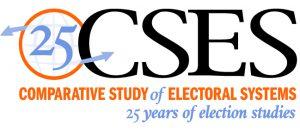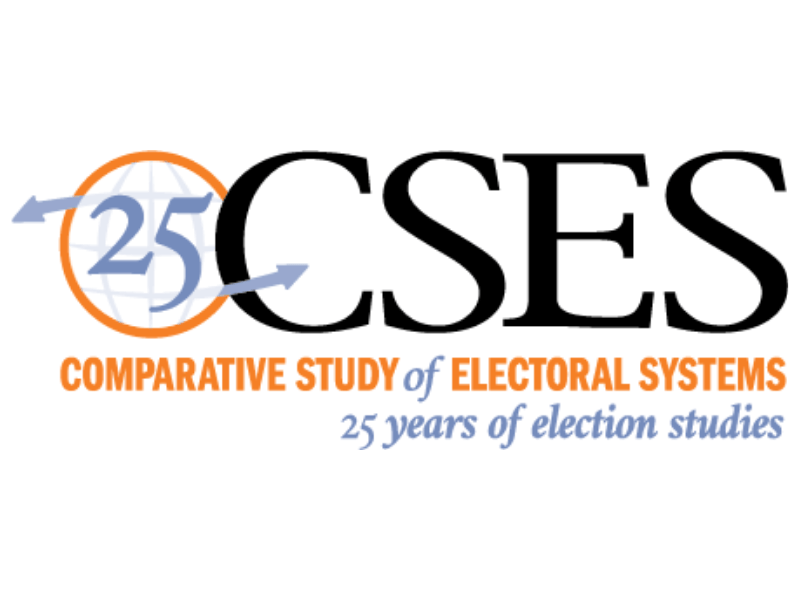
The 2019 annual meeting of the American Political Science Association (APSA) will take place in Washington DC during August 29 – September 1, 2019.
To help in planning for those who will be in attendance, we have compiled two lists below. Please be sure to confirm times and locations in the APSA program in case of last-minute changes.
The first list includes Saturday night’s CSES 25th Anniversary Roundtable and Reception (which includes a presentation of the 2019 GESIS Klingemann Prize for the Best CSES Scholarship). It also includes two special panels organized by the project, on Thursday and Saturday.
The second list includes 15 additional presentations at APSA that make use of CSES data. If you are presenting a paper at APSA using CSES and it is not listed, please let us know by email to: [email protected]
For those of you on Twitter, we will be tweeting from the conference using the hashtag #CSESat25 and encourage you to use this hashtag for your own CSES tweets as well.
Special CSES 25th Anniversary Roundtable, Reception, and Panels
Thursday, August 29th, 2019
Panel: Democratic Satisfaction, Leaders, and Mobilization: Fresh Insights from CSES
Thursday, August 29th, 2019, 4:00pm – 5:30pm
Hilton, Room: Cabinet
This panel draws together leading experts in the field of comparative electoral research and offers new insights on how democratic satisfaction and political leaders influence vote choice cross-nationally. It also provides new evidence as to how political actors are mobilizing the electorate to vote in the 21st century. Thematically, the four papers are fused together by their focus on factors that shape the dynamics of citizen-government connections. Empirically, they are united in their use of data from the Comparative Study of Electoral Systems (CSES), a project celebrating its 25th anniversary, and which allows scholars to explore electoral behavior comparatively from a micro and a macro perspective and over-time.
Presentations:
1. “Gender Differences in the Impact of Winning on Satisfaction with Democracy,” Shane P. Singh, University of Georgia; Neil S. Williams, University of Georgia
2. “Leader or Party? Evaluating the Personalization Thesis and Vote Choice 1996-2016,” Ian McAllister, Australian National University; Stephen Patrick Quinlan, GESIS Leibniz Institute for the Social Sciences
3. “Political Parties & New Modes of Mobilization in Comparative Perspective,” John H. Aldrich, Duke University; Rachel K. Gibson, University of Manchester; Pedro C. Magalhaes, University of Lisbon
4. “The Impact of Role Models on Youth Socialization in Politics,” Semra Sevi, Université de Montréal
Chair: Ian McAllister, Australian National University
Discussant: Alberto Simpser, ITAM
Saturday, August 31st, 2019
Panel: Voters and Parties – Explorations of Polarization & Competence using CSES
Saturday, August 31st, 2019, 12:00pm – 1:30pm
Hilton, Room: Columbia 1
Political parties are considered the lifeblood for democracy and consequently citizen assessments of their positions, their competence, and how they view opposition parties matter when assessing the health of a democracy and in understanding political behavior. One observation dominant in the US presently is that America is divided with parties, and some say citizens, notably split on policy and also increasing disliking opposition parties and their followers (the latter phenomenon classified as affective polarization). Yet the underlying motivations for these developments and their implications for democracy remain the subject of intense debate. To address these issues from a comparative perspective, this panel brings together prominent scholars in the field of electoral and party behavior to explore voter feelings towards parties and their impact on political behavior. All four studies take a quantitative, multivariate, and cross-national approach. They are united by their use of data from the Comparative Study of Electoral Systems (CSES), a project celebrating its 25th anniversary, and which allows scholars to explore electoral behavior comparatively from a micro and a macro perspective over-time. The first three papers explore the antecedents and impact of polarization, with comparative studies of affective polarization the focus of papers 1-3. The fourth paper puts the focus on voters’ assessments of parties’ ability to manage issues effectively, developing a novel cross-national measure of party system incompetence.
Presentations:
1. “Negative Partisanship: Polarization or Disaffection?” Eva Anduiza, Universitat Autònoma de Barcelona; Enrique Hernández, Universitat Autònoma de Barcelona; Guillem Rico, Universitat Autònoma de Barcelona
2. “Enemy Mine: Affective Polarization and Satisfaction with Democracy,” Hannah Ridge
3. “Affective Polarization in Multiparty Systems,” Markus Wagner, University of Vienna
4. “Unfit to Serve: Perceptions of Party System Incompetence & its Undermining Effect,” Robert Rohrschneider, University of Kansas; Rudiger Schmitt-Beck, University of Mannheim
Chair: Markus Wagner, University of Vienna
Discussant: Elizabeth J. Zechmeister, Vanderbilt University
Roundtable: Comparative Study of Electoral Systems (CSES) 25th Anniversary
Saturday, August 31st, 2019, 6:30pm – 7:30pm
Marriott, Room: Thurgood Marshall East
“The Future of Survey Research”
A special roundtable celebrating the 25th anniversary of the Comparative Study of Electoral Systems (CSES) project. Open to all APSA attendees.
What is the future of survey research, especially as regards election studies and electoral research, and what role do alternative methodologies serve in this future?
Panelists:
1. Jishnu Das, Lead Economist in the Development Research Group (Human Development Team) at the World Bank, a Visiting Fellow at the Center for Policy Research, New Delhi, and soon to be a faculty member at Georgetown University.
2. Sunshine Hillygus, Professor of Political Science at Duke University, has published widely on the topics of American political behavior, campaigns and elections, survey methods, public opinion, and information technology and politics.
3. Devra Moehler, Facebook Research, is a political communication specialist on the User Experience Research team at Facebook, with interests in the effects of exposure to political information and discussion on civic participation, knowledge, engagement, and attitudes
4. Katie Simmons is a senior research scientist at the Associated Press-NORC Center for Public Affairs Research, was previously an associate director of research at Pew Research Center working on their annual Global Attitudes survey, and is an expert in cross-national survey methodology.
Moderator: Eva Anduiza Perea, Universitat Autònoma de Barcelona (UAB)
Reception: 2019 GESIS Klingemann Prize for the Best CSES Scholarship
Saturday, August 31st, 2019, 7:30pm – 9:00pm
Marriott, Room: Thurgood Marshall South
This year’s reception will serve two equally important purposes: First, to honor the winners of the 2019 GESIS Klingemann Prize for the Best CSES Scholarship. This year’s awardees are Ruth Dassonneville of the University of Montreal and Ian McAllister of the Australian National University, for their article “Gender, Political Knowledge, and Descriptive Representation: The Impact of Long-Term Socialization” in the American Journal of Political Science. The second purpose of the reception will be to serve as a celebration of the 25th anniversary of the CSES project. The reception will include refreshments and a brief presentation of the winning work. Open to all APSA attendees.
Additional APSA Presentations Making Use of CSES
Thursday, August 29th, 2019
Presentation: Is Democracy Backsliding? Satisfaction with Democracy in Comparative Perspective
Thursday, August 29th, 2019, 10:00am – 11:30am
Hilton, Room: Gunston East
Authors: Holly Ann Garnett, Royal Military College of Canada; Patricia Elise Mockler, Queen’s University
In Panel: Do Citizens in Democracies Still Support Democracy?
Presentation: Populism, Campaign Effects, and the Mobilization of Populist Voters in Mexico
Thursday, August 29th, 2019, 10:00am – 11:30am
Hilton, Room: Lincoln West
Authors: Rodrigo Castro Cornejo, University of Virginia; Sandra Jessica Ley Gutierrez, CIDE; Ulises Beltran
In Panel: Anti-Corruption Politics and Reactionary Populism
Presentation: Votes and Participation: The Effect of Election Frequency on Voter Turnout
Thursday, August 29th, 2019, 12:00pm – 1:30p
Hilton, Room: Columbia 12
Authors: Filip Kostelka, University of Essex; Nicolas Sauger, Sciences-Po – Centre d’études européennes; Eva Krejcova, Sciences Po Paris
In Panel: Voter Turnout
Roundtable: Political Culture in Global Perspective
Thursday, August 29th, 2019, 4:00pm – 5:30pm
Hilton, Room: Columbia 2
Citizens around the world are discontent with politics “as usual”. Under that general cloud of disenchantment, how is political culture evolving across different regions of the world? Major comparative opinion projects provide important answers to this question, though they often operate and/or are analyzed with a region-specific focus. This roundtable brings together leading investigators from seven comparative survey projects: the AfroBarometer, AmericasBarometer, ArabBarometer, AsiaBarometer, CSES, the ESS, and the EVS/WVS. Each researcher will present data evidencing key trends in political culture, in their region and/or in comparative perspective. Through these presentations and discussion facilitated by the chair, a key objective is to highlight commonalities, and points of contrast, in trends in political culture around the globe. Secondary goals are to disseminate information on accessing analyzing data from these projects to the political science community and provide an opportunity for scholars to query project representatives about dataset archives, methods, channels for input, and future plans.
Panelists:
1. Yun-han Chu
2. Carolyn Logan, Michigan State University
3. Michael Robbins, Princeton University
4. Carlos Shenga, Universidade Joaquim CHiassano
5. Elizabeth J. Zechmeister, Vanderbilt University
6. Rory Fitzgerald, European Social Survey ERIC
Chair: Pippa Norris, Harvard University and University of Sidney
Friday, August 30th, 2019
Presentation: Right-wing Populism and Political Authoritarianism in Established Democracies
Friday, August 30th, 2019, 8:00am – 9:30am
Hilton, Room: Gunston East
Author: Todd Donovan, Western Washington University
In Panel: Populism and Extremism on the Rise: Why, How, Who?
Presentation: Populism Lite? Immigration and Electoral Politics in New Zealand
Friday, August 30th, 2019, 12:00pm – 1:30pm
Hilton, Room: Kalorama
Author: Kate McMillan, Victoria University of Wellington
In Panel: Populist Exceptionalism in a Populist Political Culture? The Case of New Zealand
Presentation: Populism, New Zealand Political Parties and Voters: Does the Coat Fit?
Friday, August 30th, 12:00pm – 1:30pm
Hilton, Room: Kalorama
Authors: Janine Hayward, University of Otago; Jack Vowles, Victoria University of Wellington
In Panel: Populist Exceptionalism in a Populist Political Culture? The Case of New Zealand
Presentation: Congruence/Satisfaction Puzzle in Parliamentary Democracies
Friday, August 30th, 2019, 2:00pm – 3:30pm
Omni, Room: Cabinet
Author: G. Bingham Powell, University of Rochester
In Panel: Achieving Representation in Electoral Democracies
Presentation: Losing the Middle Ground: Progressive Voters and Decline of Social Democracy
Friday, August 30th, 2:00pm – 3:30pm
Marriott, Room: Maryland C
Authors: Markus Wagner, University of Vienna; Tarik Abou-Chadi, University of Zurich
In Panel: Social Democracy. From Transformation to Demise?
Presentation: Of Time and Partisan Stability in Former Soviet States
Friday, August 30th, 2019, 4:00pm – 5:30pm
Hilton, Room: Lincoln East
Authors: John Aldrich, Duke University; Katelyn R. Mehling; Kristen M. Renberg, Duke University
In Panel: Authoritarianism and Political Behavior
Saturday, August 31st, 2019
Presentation: Income Distributions and the Relative Representation of Rich and Poor Citizens
Saturday, August 31st, 2019, 2:00pm – 3:30pm
Omni, Room: Senate
Authors: Mikael Persson, University of Gothenburg; Eric Guntermann, University of California, Berkeley
In Panel: Unequal Responsiveness in Advanced Democracies
Presentation: Economic Shocks, Party Competition and Turnout
Saturday, August 31st, 2019, 4:00pm – 5:30pm
Hilton, Room: Monroe
Authors: Francesc Amat, IPERG – University of Barcelona; Pablo Beramendi, Duke University
In Panel: Political Economy of Advanced Capitalism
Presentation: Populism and Political Knowledge: The United States in Comparative Perspective
Saturday, August 31st, 2019, 4:00pm – 5:30pm
Marriott, Room: Jefferson
Author: Henry Milner
In Panel: Truth, Post-Truth, and Popular Truth
Sunday, September 1st, 2019
Presentation: Determinants of Voters’ Volatility
Sunday, September 1st, 2019, 10:00am – 11:30am
Marriott, Room: Madison A
Author: Sasha Volodarsky, Northeastern University
In Panel: How Electoral Rules Shape Parties & Party Systems
Presentation: Party Positions, Voter Discontent, and Support for Non-Viable Parties
Sunday, September 1st, 2019, 10:00am – 11:30am
Marriott, Room: Madison A
Author: Robin E. Best, Binghampton University (SUNY)
In Panel: How Electoral Rules Shape Parties & Party Systems

